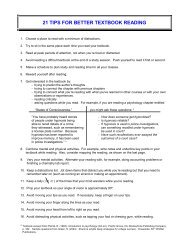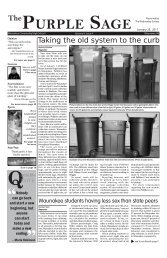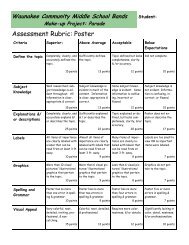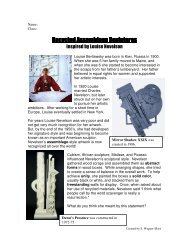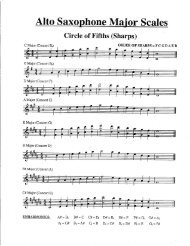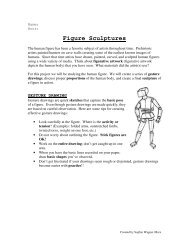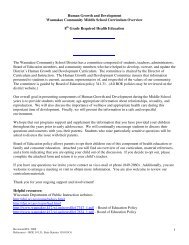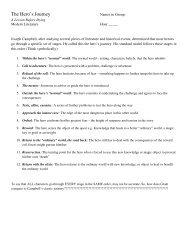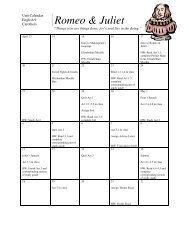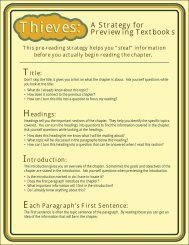Wizard or muggle- could the chances of becoming one lie in a ...
Wizard or muggle- could the chances of becoming one lie in a ...
Wizard or muggle- could the chances of becoming one lie in a ...
You also want an ePaper? Increase the reach of your titles
YUMPU automatically turns print PDFs into web optimized ePapers that Google loves.
LIFE<br />
Harry and<br />
Hermi<strong>one</strong><br />
might have<br />
acquired<br />
<strong>the</strong>ir magic<br />
powers from<br />
different<br />
genetic<br />
heritages.<br />
<strong>Wizard</strong> <strong>or</strong> <strong>muggle</strong><strong>could</strong><br />
<strong>the</strong> <strong>chances</strong> <strong>of</strong><br />
<strong>becom<strong>in</strong>g</strong> <strong>one</strong> <strong>lie</strong> <strong>in</strong><br />
a person's genes<br />
IN HARRY POTTER'S WORLD,<br />
wizards are bom, not made. Just look at Harry. He was<br />
raised from <strong>in</strong>fancy by two <strong>muggle</strong>s (n<strong>or</strong>mal, magic-less<br />
people)., Uncle Vemon and Aunt Petunia Dursley. They<br />
<strong>could</strong>n't pull a rabbit from a hat, let al<strong>one</strong> use a Cheer<strong>in</strong>g<br />
Charm to br<strong>in</strong>g some happ<strong>in</strong>ess <strong>in</strong>to <strong>the</strong>ir mean little lives.<br />
If Harry didn't pick up his magic skills from <strong>the</strong><br />
adults who raised him, where did his powers come from<br />
From his parents, <strong>of</strong> course, <strong>the</strong> witch Lily Evans and<br />
<strong>the</strong> wizard James Potter. In <strong>the</strong> same way that tall<br />
children tend to have tall parents, <strong>the</strong> wizard children<br />
<strong>in</strong> J. K. Rowl<strong>in</strong>g's fiction seem to have magic parents.<br />
That's not <strong>the</strong> case f<strong>or</strong> Hermi<strong>one</strong> Granger, however.<br />
Both <strong>of</strong> her parents are <strong>muggle</strong>s, yet she is <strong>one</strong> <strong>of</strong><strong>the</strong><br />
best students at <strong>the</strong> Hogwarts School <strong>of</strong> Witchcraft and<br />
<strong>Wizard</strong>ry. If children derive <strong>the</strong>ir magic powers from<br />
<strong>the</strong>ir parents, where did Hermi<strong>one</strong>'s magic come from<br />
Is <strong>the</strong>re any logic <strong>in</strong> <strong>the</strong> w<strong>or</strong>ld <strong>of</strong> wizards<br />
Yes, say genetics researchers <strong>in</strong> Australia. Last summer,<br />
<strong>the</strong>y published a letter <strong>in</strong> <strong>the</strong> science journal Nature<br />
contend<strong>in</strong>g that wizard<strong>in</strong>g <strong>could</strong> have a genetic basis.<br />
Their <strong>the</strong><strong>or</strong>y is as fanciftil as a fly<strong>in</strong>g broomstick, but<br />
Harry's w<strong>or</strong>ld can still teach us someth<strong>in</strong>g about how<br />
people <strong>in</strong>herit different characteristics, says Jeff Craig,<br />
a geneticist at <strong>the</strong> Royal Children's<br />
By Chris Jozefowicz<br />
Hospital <strong>in</strong> Melbourne, Australia.<br />
GENETIC BULLIES<br />
Geneticists call <strong>the</strong> characteristics<br />
that we <strong>in</strong>herit from our parents traits.<br />
Traits, such as eye col<strong>or</strong> and hair col<strong>or</strong>,<br />
are determ<strong>in</strong>ed by long stretches <strong>of</strong> DNA<br />
called genes. Every person has two<br />
versions <strong>of</strong> each gene, <strong>one</strong> <strong>in</strong>herited<br />
from Dad, and <strong>one</strong> from Mom.<br />
Sometimes <strong>the</strong> two versions are<br />
identical. Sometimes <strong>the</strong>y are different<br />
and are termed alleles. Two bro<strong>the</strong>rs can have different<br />
eye col<strong>or</strong>s because each bro<strong>the</strong>r <strong>in</strong>herited a different set<br />
<strong>of</strong> alleles from <strong>the</strong>ir parents.<br />
What's m<strong>or</strong>e, some alleles, called dom<strong>in</strong>ant alleles,<br />
have a stronger effect on traits than o<strong>the</strong>r, weaker alleles,<br />
which are called recessive alleles. Craig likens <strong>the</strong> situation<br />
to a schoolyard. "The dom<strong>in</strong>ant ailele is a bully," he<br />
says, "and if <strong>the</strong>re is a bully around, <strong>the</strong> recessives are put<br />
<strong>in</strong> <strong>the</strong>ir place. But when <strong>the</strong>re is no <strong>one</strong> to pick on <strong>the</strong>m,<br />
when <strong>the</strong>re is no bully around, <strong>the</strong> recessives can express<br />
<strong>the</strong>mselves."<br />
HARRy, HERMIONE, HEREDITy<br />
Craig, toge<strong>the</strong>r with education researchers Renee Dow<br />
and Mary Anne Aitken, suggests that wizardry arises<br />
from a recessive ailele (w) that gives people magic<br />
powers. The <strong>muggle</strong> version (M) <strong>of</strong><strong>the</strong> same gene is a<br />
dom<strong>in</strong>ant ailele. Only a child who <strong>in</strong>herits <strong>one</strong> wizard<br />
ailele from each parent (ww) can become a wizard.<br />
If <strong>the</strong> child <strong>in</strong>herits two <strong>muggle</strong> alleles (MM), he <strong>or</strong><br />
won't have magic powers.
MUGGLES IN THE MIX<br />
Punnet squares are used to chart possible <strong>in</strong>heritance patterns.<br />
The alleles <strong>of</strong> each parent are displayed at <strong>the</strong> top and <strong>the</strong> side<br />
<strong>of</strong><strong>the</strong> square. Each box represents a possible pair<strong>in</strong>g <strong>of</strong> alleles<br />
<strong>in</strong> a child. F<strong>or</strong> Hermi<strong>one</strong> Granger to become a wizard, her<br />
parents had to have this square:<br />
Hermi<strong>one</strong>'s mo<strong>the</strong>r<br />
^ M (<strong>muggle</strong> allele] W (wizard altetel<br />
^<br />
(A<br />
"qj<br />
c<br />
o<br />
M<br />
(<strong>muggle</strong> aitele)<br />
Iwtzard alfele)<br />
MM<br />
<strong>muggle</strong><br />
wM<br />
<strong>muggle</strong><br />
Mw<br />
<strong>muggle</strong><br />
ww<br />
wizard<br />
Every child from twoMw parents has an equal chance<br />
<strong>of</strong> gett<strong>in</strong>g a <strong>muggle</strong> <strong>or</strong> a wizard allele from each parent<br />
But because <strong>the</strong> <strong>muggle</strong> allele is dom<strong>in</strong>ant, <strong>the</strong>re are three<br />
<strong>chances</strong> <strong>of</strong> produc<strong>in</strong>g a muggfe and only <strong>one</strong> chance <strong>of</strong><br />
produc<strong>in</strong>g a wizard. Theref<strong>or</strong>e, on average, only <strong>one</strong> <strong>of</strong> four<br />
children (<strong>or</strong> 25 percent) would be a wizard.<br />
Because both <strong>of</strong> Harry's paretits had magical powers,<br />
each <strong>one</strong> must have had two recessive alleles (ww). They<br />
<strong>could</strong> have passed on only recessive genes to Harry,<br />
dest<strong>in</strong><strong>in</strong>g him to become a wizard.<br />
Hermi<strong>one</strong>'s <strong>in</strong>heritance is m<strong>or</strong>e complex, because<br />
both her parents are <strong>muggle</strong>s. Craig says Hermi<strong>one</strong>'s<br />
parents must both be carriers <strong>of</strong> <strong>the</strong> wizard allele. A carrier<br />
has a recessive allele and a dom<strong>in</strong>ant allele—<strong>in</strong> this<br />
case., a w and an M. Each <strong>of</strong> Hermi<strong>one</strong>'s parents would<br />
still be a <strong>muggle</strong> because <strong>muggle</strong>ness is dom<strong>in</strong>ant and<br />
overpowers wizard<strong>in</strong>g. But <strong>the</strong> Grangers <strong>could</strong> make a<br />
magic child by pass<strong>in</strong>g on two recessive alleles to <strong>the</strong>ir<br />
child. (Sec "Muggles <strong>in</strong> <strong>the</strong> Mix.")<br />
In real life, certa<strong>in</strong> diseases, such as cysticfibrosis,<br />
are <strong>in</strong>herited <strong>in</strong> a similar manner. Cystic fibrosis is a<br />
Gene<br />
The supeHong DNA molecules <strong>in</strong> <strong>the</strong> nucleus <strong>of</strong> each<br />
cell <strong>in</strong> <strong>the</strong> human body are coiled <strong>in</strong> structures called<br />
chromosomes.<br />
Segments <strong>of</strong><strong>the</strong> DNA molecules are<br />
temied genes.They number about 25,000 <strong>in</strong> human<br />
DNA and help determ<strong>in</strong>e <strong>the</strong> body's various traits.<br />
Harry's Aunt Petunia, pictured here with Uncle Vemon<br />
and <strong>the</strong>ir vile <strong>of</strong>fspr<strong>in</strong>g, Dudley, is <strong>the</strong> sister <strong>of</strong> Harry's<br />
mo<strong>the</strong>r. Could she carry <strong>the</strong> gene f<strong>or</strong> magic powers<br />
Could Dudley<br />
disease that causes a buildup <strong>of</strong> thick mucus <strong>in</strong> <strong>the</strong> lungs<br />
that leads to breath<strong>in</strong>g problems. It arises when a child<br />
<strong>in</strong>herits two recessive alleles, <strong>one</strong> from each parent.<br />
HOGWARTS OR HOGWASH<br />
One month after Craig's letter appeared. Nature published<br />
a response from a trio <strong>of</strong> researchers <strong>in</strong> plant<br />
genetics at <strong>the</strong> University <strong>of</strong> Cambridge <strong>in</strong> England.<br />
They disagree with <strong>the</strong> Australian team's notion. "We<br />
be<strong>lie</strong>ve <strong>the</strong> assumption that wizard<strong>in</strong>g has a genetic<br />
basis to be determ<strong>in</strong>istic and unsupp<strong>or</strong>ted by available<br />
evidence," <strong>the</strong>y wrote.<br />
The Cambridge group compla<strong>in</strong>s that if wizard<strong>in</strong>g<br />
is determ<strong>in</strong>ed by recessive alleles, it should have turned<br />
up m<strong>or</strong>e <strong>of</strong>ten <strong>in</strong> <strong>the</strong> Granger family pedigree—<strong>the</strong><br />
family's ancestral l<strong>in</strong>e. "As Rowl<strong>in</strong>g fans <strong>could</strong> po<strong>in</strong>t<br />
out," <strong>the</strong> Cambridge researchers wrote, "Hermi<strong>one</strong>'s<br />
parents were <strong>muggle</strong> dentists who lack any family<br />
hist<strong>or</strong>y <strong>of</strong> wizard<strong>in</strong>g."<br />
But Craig says researchers don't always f<strong>in</strong>d a family<br />
hist<strong>or</strong>y <strong>of</strong> disease <strong>in</strong> real-life medical conditions that<br />
arise from two recessive alleles. "In many <strong>of</strong><strong>the</strong> pedigrees,<br />
<strong>the</strong> ancest<strong>or</strong>s don't show a s<strong>in</strong>gle case," he says.<br />
"Two different recessive alleles just happen to come<br />
toge<strong>the</strong>r <strong>in</strong> a particular generation." The alleles are not<br />
only recessive but also rare.<br />
The Cambridge researchers also have a m<strong>or</strong>e general<br />
compla<strong>in</strong>t. They th<strong>in</strong>k Craig's idea is determ<strong>in</strong>istic—that<br />
it takes a complex trait like wizard<strong>in</strong>g and assumes without<br />
evidence that it must have a simple genetic explanation.<br />
Perhaps wizard<strong>in</strong>g arises from <strong>the</strong> <strong>in</strong>teraction <strong>of</strong> many<br />
genes and various environmental <strong>in</strong>fluences.<br />
"I th<strong>in</strong>k that's a valid po<strong>in</strong>t," Craig concedes. "We<br />
have to beware <strong>of</strong><strong>the</strong> attitude <strong>of</strong> determ<strong>in</strong>ism. But<br />
I th<strong>in</strong>k it depends on how serious you want to take it.<br />
We th<strong>in</strong>k <strong>the</strong>y were be<strong>in</strong>g a bit too serious <strong>the</strong>re."CS<br />
CURRENT SCIENCE March 17.2006 5



